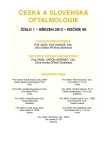Simple Binocular Vision Evaluation on Healthy Adult Subjects with Synoptophore
Authors:
P. Veselý; S. Synek
Authors‘ workplace:
Klinika nemocí očních a optometrie LF MU a FN u sv. Anny, Brno, přednosta doc. MUDr. S. Synek, CSc.
Published in:
Čes. a slov. Oftal., 69, 2013, No. 1, p. 18-24
Category:
Original Article
Overview
Purpose:
The main goal of our study was to determine the database of parameters of simple binocular vision (SBV) in healthy adult population. Next goal was to verify current data of particular parameters of SBV. Recent public data (e.g. Divisova, Hromadkova) were determined without proper specification of examination (size of fusion object), or are too diffused (e.g. from 15 to 25 prismatic diopters = pD). At last we want to prove, if there are some other factors, which could influence parameters of SBV.
Methods:
We had 74 subjects (64 women, 10 men) without significant eye pathology with average age of 24.82 years (max. 28 years, min. 22 years, SD 2.5 years). Particular parameters of SBV were examined without corrective lenses by emetropes, but with habitual correction by ametropes all on Sbisa synoptophore. We measured minimally 16 parameters of SBV, which were note in centimeters (pupillary distance) and in prismatic dioptres (deviation, fusion range and so on). These data were than statistically processed with program MS Excel and with Statitstika version 10. Level of statistical significance was set on p = 0.05.
Results:
We got, thanks our study, these significant average results: Subjective deviation for far of all 74 subjects was count to 2.78 ± 3.65 pD, of women was 2.90 ± 3.69 and only for men was 2.00 ± 3.49. This result probably shows inadequate elimination of proximal convergence with the instrument. According our measurement of positive fusion range of all subjects is 25.10 ± 12.77 pD and negative fusion range -6.45 ± 4.18 dD, accommodation convergence to accommodation ration (AC/A) is 3.41 ± 1.47 pD a subjective deviation by accommodation on 33 cm (with minus 3 D) is 13.02 ± 5.23 pD. Further we proved statistical significant correlation between these parameters of SBV: Age and AC/A, SU-3 and AC/A, SU0 and SU-3, SU-3 and FS0 and FS-3. We didn’t find any statistical significant differences, when we compared SBV parameters between emetropes, hypermetropes and myopes. The same results we got (except of pupillary distance), when we compared data divided according to gender.
Conclusion:
In our study we set the normative average data of SBV parameters, which were measured on healthy adult emetropes and ametropes with habitual correction. We also find how parameters influence each other. All SBV parameters differ on statistical significant level, when we compared them with respect to refractive state and gender. Knowledge of basic SBV parameters is important not only for ophthalmologist but also for optometrists. They can influence these in that way, which can bring comfortable SBV. The most frequent optometric methods are proper sphere-cylindrical correction, prismatic correction and visual training.
Key words:
simple binocular vision, synoptophore, subjective deviation, positive fusion range, negative fusion range, accommodation convergence to accommodation ration, pupillary distance
Sources
1. Divišová, G.: Strabismus. Praha: Avicenum, 1979. 297 s. ISBN 80-201-0037-7.
2. Duke-Elder, S.: System of Opthalmology, IV. díl, H. Kimpton, London, 1969.
3. Hurt, J. a spol.: Orthoptics and Ocular Motility. C.V. Mosby Comp. St. Louis, 1972.
4. Veselý, P.: Synoptofor – přístroj pro diagnostiku a léčbu poruch binokulárního vidění, Česká oční optika, 2009; 2 : 56–59.
5. Lešinská, L.: Synoptofor – možnosti vyšetření a jeho vyhodnocení, bakalářská práce, Brno 2011, Lékařská fakulta MU, s. 57.
6. Rutrle, M.: Přístrojová optika, 1. vydání Brno: Institut pro další vzdělávání pracovníků ve zdravotnictví, 2000; 189 s.
7. Hromádková, L.: Šilhání. 2. vydání, Brno, Institut pro další vzdělávání pracovníků ve zdravotnictví, 1995, 163 s.
8. Adamek, B., Karczewicz, D.: The dependence of the range of fusion on some selected function of the visual system. Part 1: Study on convergent and divergent fusion. Klin Oczna. 2006; 108 (4–6): 163–6.
9. Melville, A.: Is there a relationship between prism fusion range and vergence facility? Br. Orthopt J, 2002; 59 : 38–44.
10. Sharma P., Prakash P.: Effect of aniseikonia on fusion. Indian J Ophthalmol 1991; 39 : 170–173.
Labels
OphthalmologyArticle was published in
Czech and Slovak Ophthalmology

2013 Issue 1
-
All articles in this issue
- Bilateral Neuroretinitis as an Ocular Manifestation of Cat Scratch Disease in 9-year-old Boy. A Case Report
- Retinitis Pigmentosa Mimicking Uveitis. A Case Report
- Adenoma of the Ciliary Body in 3-year-old Boy – a Case Report
- Contribution Focused to Clarify Correlation between Mixtures of the Free Amino Acids with Antiglaucomatics in Influencing the IOP in Rabbit’s after Application into the Conjunctival Sac
- Clinical Findings in Members of a Czech Family with Retinitis Pigmentosa Caused by the c.2426_2427delAG Mutation in RPGR
- Simple Binocular Vision Evaluation on Healthy Adult Subjects with Synoptophore
- Aductive Laser Iridoplasty and Laser Goniopuncture after Non-perforating Trabeculectomy
- Czech and Slovak Ophthalmology
- Journal archive
- Current issue
- About the journal
Most read in this issue
- Clinical Findings in Members of a Czech Family with Retinitis Pigmentosa Caused by the c.2426_2427delAG Mutation in RPGR
- Bilateral Neuroretinitis as an Ocular Manifestation of Cat Scratch Disease in 9-year-old Boy. A Case Report
- Retinitis Pigmentosa Mimicking Uveitis. A Case Report
- Simple Binocular Vision Evaluation on Healthy Adult Subjects with Synoptophore
